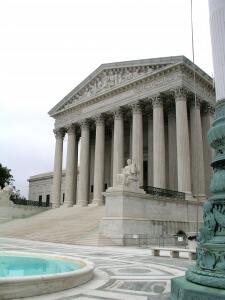A Supreme Opinion: Constitutionality of Non-Religion
December 14th, 2018

The late Supreme Court Justice Antonin Scalia gave his thoughts on the constitutionality of religion during a 2016 speech, and much debate ensued.
What happened when one of the most influential judicial individuals in the country started discussing his position on a topic that was not currently in front of his court? Aside from making several reporters very happy to have a good headline, much speculation began to circulate about the state of the law surrounding that topic. Many people started to question what would happen if a case reached the highest court that dealt with that issue. These questions were asked after somewhat controversial statements made by the late Supreme Court Justice Antonin Scalia with regard to the constitutionality of religion, and more specifically, whether “non-religion” is protected by the highest law of the land.
Constitutionality of Religious Freedom
Rarely has one phrase garnered more attention and been as hotly debated throughout the centuries as the phrase “religious freedom.” What this phrase means and protects has been the subject of countless thesis papers and law review articles, yet we are arguably no closer to a definitive answer on constitutionality than when the words were first coined (which, for the record was not specifically at the penning of the U.S. Constitution). Justice Scalia’s comments to a small group at a Louisiana high school reflected his opinion that a conservative reading of the text does not warrant an interpretation that excludes religion as a whole from American governance. He claimed that the original text, when taken in a historical context, mandates only that the government not favor one religion over another.
According to the Justice, the founders themselves were religious and religion permeated every element of early Americans’ lives. According to one report, he went so far as to say that we are who we are because of our religious devotion, not despite it. He explained his comments by stating that it was not until the 1960’s when “activist judges” reinterpreted the document’s First Amendment to allow for protection over non-religious ideas and beliefs. Many believe just as ardently that the language protects all people, even those whose belief systems do not include religion. For those who wish to do their own interpretation, the short text of the amendment can be found here.
Moving Forward
It is more than interesting that the late Justice Scalia chose such a small venue to make these very thought-provoking statements. While they did not reflect anything more than his personal opinions on the subject and likely did not reflect the opinions of his colleagues, they were nevertheless his and that is no small thing. There were arguably only a small group of individuals in the country whose opinions on the constitutionality of religion mattered as much, so it is surprising that he seemed to provide it without care or thought to the impact of his words. Perhaps not enough credit was given to Justice Scalia and he chose his words extremely carefully, but only time will tell if his preferred interpretation takes its place in the annals of American jurisprudence through adoption by the others on the Court, including the newer members who replaced him.
With the rise of religious freedom laws in states across the country, it can be said with a fair amount of certainty that this issue will come before the Supreme Court at some point in the near future. When it does, the Universal Life Church Case Law will monitor and report any cases bringing this topic for review so that we can all share in the debate as it makes its way to the highest Court.


